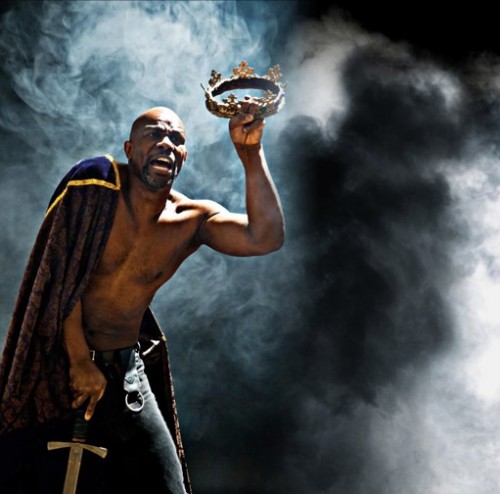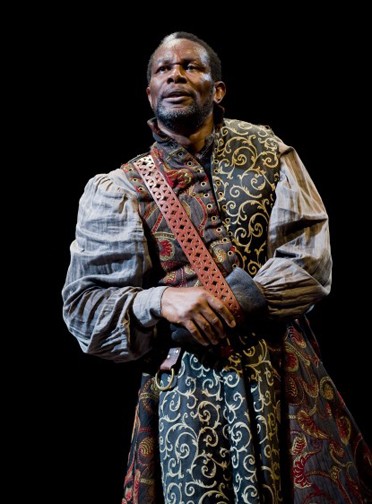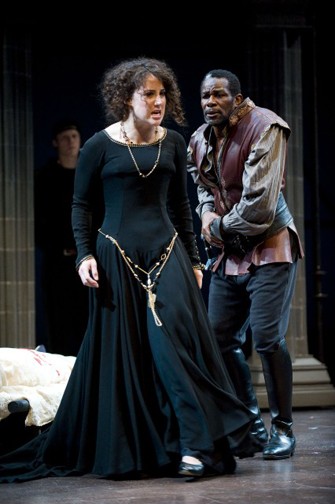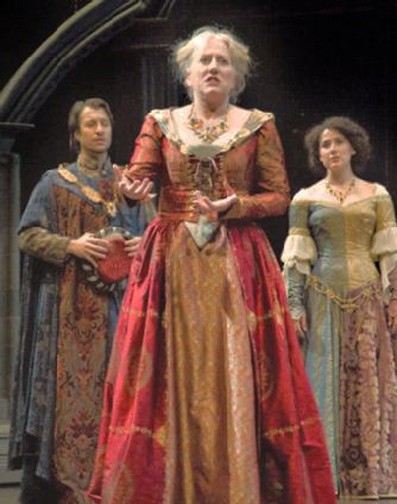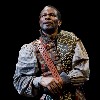John Douglas Thompson Plays a Hunch
Richard III Reconfigured at Shakespeare & Company
By: Charles Giuliano - Jul 13, 2010
The Life and Death of King Richard III
by William Shakespeare
Conceived and adapted by Tony Simotes
Directed by Jonathan Croy
Set and Props by Patrick Brennan, Costume Design by Arthur Oliver, Lighting Design by Les Dickert, Composer and Sound Designer Scott Kilian, Fight Choreography by Ryan Winkles, Assistant Director Malcolm Ingram, Production Stage Manager Hope Rose Kelly, Directed by Jonathan Croy. Production sponsored by Rebecca and Nathan Milikowsky.
Cast: Jason Asprey (Lord Hastings), Bill Barclay (First murderer), Robert Biggs (Lord Stanley), Wolfe Coleman (Brackenbury), Johnny Lee Davenport (King Edward IV/ Lord Mayor of London/ Captain Blunt), Leia Espericueta (Lady Anne), Nigel Gore Duke of Buckingham), Elizabeth Ingram m(Queen Margaret), Zoe Laiz (Young Elizabeth), Josh Aaron McCabe (Sir William Catesby), Anette Miller (Duchess of York), William Palmer (Edward, Prince of Wales), Judah Piepho (Richard, Duke of York), Tod Randolph (Queen Elizabeth), Douglas Seldin (Lord Grey), Rocco Sisto (Duke of Clarence), Enrico Spada (Earl Rivers), Andy Talen (Earl of Richmond), John Douglas Thompson (Richard Duke of Gloucester later Richard III), Ryan Winkles (Second Murderer/ Sir James Tyrrel).
Shakespeare & Company
The Founders Theatre, Lenox, MA,
July 2- September 5, 2010.
Now is the winter of our discontent
Made glorious summer by this sun of York;
And all the clouds that lour'd upon our house
In the deep bosom of the ocean buried.
Now are our brows bound with victorious wreaths;
Our bruised arms hung up for monuments;
Our stern alarums chang'd to merry meetings,
Our dreadful marches to delightful measures.
Grim-visag'd war hath smooth'd his wrinkled front;
And now,--instead of mounting barbed steeds
To fright the souls of fearful adversaries,--
He capers nimbly in a lady's chamber
To the lascivious pleasing of a lute.
But I,--that am not shap'd for sportive tricks,
Nor made to court an amorous looking-glass;
I, that am rudely stamp'd, and want love's majesty
To strut before a wanton ambling nymph;
I, that am curtail'd of this fair proportion,
Cheated of feature by dissembling nature,
Deform'd, unfinish'd, sent before my time
Into this breathing world scarce half made up,
And that so lamely and unfashionable
That dogs bark at me as I halt by them;--
Why, I, in this weak piping time of peace,
Have no delight to pass away the time,
Unless to spy my shadow in the sun,
And descant on mine own deformity:
And therefore,--since I cannot prove a lover,
To entertain these fair well-spoken days,--
I am determined to prove a villain,
And hate the idle pleasures of these days.
Plots have I laid, inductions dangerous,
By drunken prophecies, libels, and dreams,
To set my brother Clarence and the king
In deadly hate the one against the other:
And if King Edward be as true and just
As I am subtle, false, and treacherous,
This day should Clarence closely be mew'd up,--
About a prophecy which says that G
Of Edward's heirs the murderer shall be.
Dive, thoughts, down to my soul:--here Clarence comes.
Is there a more compelling and insightful opening speech in the entire canon?
With succinct invective Richard carves out his outrageous ambition to destroy the interval of peace that he helped to create. Through cunning and ruthless murder he aspires to scratch and claw his way to the throne. He not only announces his evil agenda but also gives us its craven justification. Here is a bitter and deformed individual, scarse half made up, that even dogs bark at when he halts by them.
He is scorned by the amorous looking glass and finds no favor with the fairer sex. With these opening lines Richard defines himself as a monster, a reject of humanity, and yet he asks and expects no pity. That self loathing, and the scorn of peers at his deformed appearance, has been channeled with brilliant rage into stunning ambition.
Through his scheming and cleverness an Empire will crumble to serve his ego and ambition. There is a singular drive for personal glory. With that power and authority he intends to seduce and conquer not only the realm but also any fair beauty whom he craves to share his bed.
How is it possible that one so severely handicapped, both physically and mentally, triumphs in this daunting agenda? However briefly.
The dramatic arc of Richard III, his rise and fall compressed into three hours of riveting theatre, is surely one of the greatest and most challenging of all of Shakespeare’s roles. It demands of us the suspension of belief that this crippled, self absorbed, freak may seize the throne for his own satisfaction. And, almost as an aside, cunningly seduce Lady Anne (Leia Espericueta) the daughter of Henry VI whom he murdered.
The brothers Edward IV (Johnny Lee Davenport), Richard, Duke of Gloucester (John Douglas Thompson) and Duke of Buckingham (Nigel Gore) all plotted against Henry but it is Richard who did the deed.
In his ambition to be king, however, there are others in succession for the crown. When Edward IV dies of natural causes the next in line is Edward, Prince of Wales (William Palmer). Richard, as his uncle, is to serve as Regent and Protector until the Prince matures to take the throne. Edward has a younger brother. Then there is the matter of Clarence. Richard sows dissent with Edward who has their brother taken to the Tower, later to be dispatched, when Richard ascends to power.
Not only must Richard hack a path through his own family there is also the threat of the Earl of Richmond (Andy Talen) son of the slain King Henry. Richmond ultimately will regain the crown for his clan by ending the too brief reign of Richard on Bosworth field.
From the opening lines of “Now is the winter of our discontent” we are put on notice that this is to be a new and radical interpretation of the deformed Richard. As the play begins he is laying on the stage facing the audience. We hear the familiar lines and wonder what is going on. Why is he lying there? What point is being made by this?
Slowly and awkwardly Thompson rose to his feet. In this process revealing to us a man more severely handicapped than is the norm for the role. There is the familiar hunch back conveyed in the superb period costumes of Arthur Oliver. It is good to see him back designing for the company. In addition to the usual hump and club foot Thompson also has a withered arm tethered in a sling. It is harrowing to see him so hobbled and limping through the play that has episodes that demand agility and energy. He evokes no empathy for his handicaps. There is no entitlement for such evil intent.
It is inevitable to compare Thompson’s Richard to Sir Laurence Olivier’s paradigmatic interpretation. Arguably, Olivier created the greatest of all Shakespearean films in 1955.
For that opening scene Olivier took full advantage of the medium to play into a close up camera. He seems to be conversing with the viewer drawing us into his scheme. With amazing intimacy he sketched a self deprecating portrait of his deformity and its resultant misanthropic malice.
In his book Oliver discussed Richard as arguably his greatest triumph. It is impossible to disagree. Each viewing of the film proves to be ever more absorbing and intriguing. He played Richard as grotesque but also smarmily vain and effeminate. The makeup distorted his face to resemble that of an actor whom he actually despised. There are layers upon layers of arrogant contradiction in the role.
There is no greater polarity in the approaches of Olivier and Thompson than in the seduction of Lady Anne. Olivier brilliantly overwhelmed her hatred with the dissembled sincerity of his passion. Proving his love by taunting her to thrust a sword into the heart of the man who slew her father. He made the scene phenomenally believable. It was a riveting and masterful moment. Nothing in his career more aptly coveyed his genius as an actor.
With Thompson the scene is palyed as less a seduction than an assault. His Richard is a soldier and man of action. Her resistance is overwhelmed with the attack of his logic, energy, cunning and passion. She is just a foil and obstacle to his ambitions. Once conquered he will have no further use for her. She is just another pelt on his belt.
If the Olivier interpretation of Richard has prevailed for more than half a century then arguably it is time for an extreme makeover. Having triumphed with Othello now Thompson, one of the finest Shakespearian actors of our time, is making his way through the canon. It has been reported that he may return to Lenox next summer in Hamlet. In the fall he will play opposite Kate Mulgrew in Antony and Cleopatra at the Hartford Stage. This past season he appeared in a stunning Emperor Jones for the Irish Repertory Company in New York. With Dianne Wiest he performed The Forest at Classic Stage Company in New York.
Although I am entirely committed to Thompson, as one of the finest artists of our time, I found this production and interpretation unsettling. Perhaps I am too clouded by the Olivier. But I didn’t feel that way about Thompson’s Othello which redefined the role. The standards for Othello were embarrassing films by Olivier as well as Orson Welles. Placido Domingo has been superb in Verdi's opera Otello.
The concern I suggest is not that Thompson is portraying a Caucasian King of England. Race is never a factor in his Richard. It is a tribute to his skill and power that we focus on his brilliance and charisma as an actor. This success in Richard, opening to generally rave reviews, encourages Thompson to work his way through all of the great roles. Just imagine his Lear one day. It would also be fascinating to see him cross over and play Iago. There is no limit to his potential.
But this time, well. He just seemed too hobbled. By playing Richard as severely handicapped it boxed him in; too literally constricting his movement. He was indeed playing the role with one hand behind his back.
The production, conceived by the artistic director, Tony Simotes, was both faithful, perhaps tediously so in not condensing the running time, as well as over the top. Too many scenes were played for laughs, particularly by Johnny Lee Davenport, as the Lord Mayor of London. In an attempt to sell the notion of Richard as King he leads the audience in a cheering session having us chant “Richard, Richard, Richard.”
Come now Tony, that is hardly Elizabethan. It has enduced critics to review the production as a comedy. Which it certainly is not. There is nothing funny about murder and ruthless ambition.
Because of illness Simotes withdrew and Johnathan Croy stepped in. So it is unclear just who made the decision to reach for comic relief. The actors run up and down aisles, or perform from balconies. It was both enlivening as well as distracting. There was also a decision to have the women mopping up the stage with over the top bathos.
The women often were too shrill particularly the seduction scene with Lady Anne. Espericueta's emotions did not develop evenly. She quickly escalated into the upper register which is too obvious a means of conveying anger. There was little arc allowing her to come down from that strident intensity when submitting to Richard’s outrageous charm. The scene was just not convincing.
Too often the pace and synergy of the evening was askew. The play did not unfold consistently. Rather it ebbed and flowed based on the skill of specific actors.
In that regard the scene of the condemned Clarence performed by Rocco Sisto was just lovely. It was an emotional high point of the evening. Similarly, we came to truly feel for the duped Duke of Buckingham (Nigel Gore). His performance was masterful as a conspirator who was seduced and abandoned. Had Richard simply kept his promise to Buckingham how different might have been the outcome on Bosworth field. Richard blew him off because he wouldn’t go along with murdering the lads in the Tower. Buckingham revealed to us his conscience and humanity. Richard saw that as betrayal. Of the women we were particularly taken with the Duchess of York played by Anette Miller. Robert Biggs nicely conveyed the dilemma of Lord Stanley.
One of the stunning artistic decisions of this production was to have Richard tormented by the ghosts of his victims during the night before the battle with the Earl of Richmond. The murdered boys also show up and distract Richard during the superbly staged fight scene.
We had waited all night for “A horse, a horse, my kingdom for a horse.” We were not disappointed.
Based on the critical reception it is entirely possible that Thompson has set a new paradigm for Richard III. For me it is an ambitious but flawed interpretation. Surely he will be invited to perform the role for years to come. It will be intriguing to see how the character is modified in subsequent productions with different directors.
Berkshire audiences are truly blessed with the opportunity to see, season after season, one of the great artists of our time evolve before our eyes. However problematic this is a role and production that is not to be missed.

